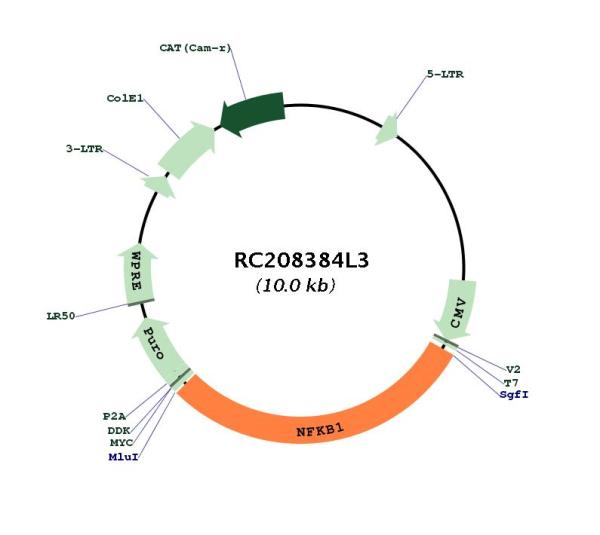NFKB1 (NM_003998) Human Tagged Lenti ORF Clone
CAT#: RC208384L3
- LentiORF®
Lenti ORF clone of Human nuclear factor of kappa light polypeptide gene enhancer in B-cells 1 (NFKB1), transcript variant 1, Myc-DDK-tagged
"NM_003998" in other vectors (6)
Specifications
| Product Data | |
| Type | Human Tagged ORF Clone |
| Tag | Myc-DDK |
| Symbol | NFKB1 |
| Synonyms | CVID12; EBP-1; KBF1; NF-kappa-B1; NF-kappaB; NF-kappabeta; NF-kB; NF-kB1; NFkappaB; NFKB-p50; NFKB-p105 |
| Vector | pLenti-C-Myc-DDK-P2A-Puro |
| E. coli Selection | Chloramphenicol (34 ug/mL) |
| Mammalian Cell Selection | Puromycin |
| Sequence Data |
The ORF insert of this clone is exactly the same as(RC208384).
|
| Restriction Sites |
SgfI-MluI
Cloning Scheme for this gene
Plasmid Map

|
| ACCN | NM_003998 |
| ORF Size | 2907 bp |
| OTI Disclaimer | The molecular sequence of this clone aligns with the gene accession number as a point of reference only. However, individual transcript sequences of the same gene can differ through naturally occurring variations (e.g. polymorphisms), each with its own valid existence. This clone is substantially in agreement with the reference, but a complete review of all prevailing variants is recommended prior to use. More info |
| OTI Annotation | This clone was engineered to express the complete ORF with an expression tag. Expression varies depending on the nature of the gene. |
| Product Components | The ORF clone is ion-exchange column purified and shipped in a 2D barcoded Matrix tube containing 10ug of transfection-ready, dried plasmid DNA (reconstitute with 100 ul of water). |
| Reconstitution | 1. Centrifuge at 5,000xg for 5min. 2. Carefully open the tube and add 100ul of sterile water to dissolve the DNA. 3. Close the tube and incubate for 10 minutes at room temperature. 4. Briefly vortex the tube and then do a quick spin (less than 5000xg) to concentrate the liquid at the bottom. 5. Store the suspended plasmid at -20°C. The DNA is stable for at least one year from date of shipping when stored at -20°C. |
| Reference Data | |
| RefSeq | NM_003998.2, NP_003989.2 |
| RefSeq Size | 4104 bp |
| RefSeq ORF | 2910 bp |
| Locus ID | 4790 |
| UniProt ID | P19838 |
| Cytogenetics | 4q24 |
| Domains | RHD, DEATH, ANK, IPT |
| Protein Families | Druggable Genome, Transcription Factors |
| Protein Pathways | Acute myeloid leukemia, Adipocytokine signaling pathway, Apoptosis, B cell receptor signaling pathway, Chemokine signaling pathway, Chronic myeloid leukemia, Cytosolic DNA-sensing pathway, Epithelial cell signaling in Helicobacter pylori infection, MAPK signaling pathway, Metabolic pathways, Neurotrophin signaling pathway, NOD-like receptor signaling pathway, Pancreatic cancer, Pathways in cancer, Prostate cancer, RIG-I-like receptor signaling pathway, Small cell lung cancer, T cell receptor signaling pathway, Toll-like receptor signaling pathway |
| MW | 105.2 kDa |
| Gene Summary | This gene encodes a 105 kD protein which can undergo cotranslational processing by the 26S proteasome to produce a 50 kD protein. The 105 kD protein is a Rel protein-specific transcription inhibitor and the 50 kD protein is a DNA binding subunit of the NF-kappa-B (NFKB) protein complex. NFKB is a transcription regulator that is activated by various intra- and extra-cellular stimuli such as cytokines, oxidant-free radicals, ultraviolet irradiation, and bacterial or viral products. Activated NFKB translocates into the nucleus and stimulates the expression of genes involved in a wide variety of biological functions. Inappropriate activation of NFKB has been associated with a number of inflammatory diseases while persistent inhibition of NFKB leads to inappropriate immune cell development or delayed cell growth. NFKB is a critical regulator of the immediate-early response to viral infection. Alternative splicing results in multiple transcript variants encoding different isoforms, at least one of which is proteolytically processed. [provided by RefSeq, Aug 2020] |
Documents
| Product Manuals |
| FAQs |
| SDS |
Resources
Other Versions
| SKU | Description | Size | Price |
|---|---|---|---|
| RC208384 | NFKB1 (Myc-DDK-tagged)-Human nuclear factor of kappa light polypeptide gene enhancer in B-cells 1 (NFKB1), transcript variant 1 |
USD 887.00 |
|
| RC208384L1 | Lenti ORF clone of Human nuclear factor of kappa light polypeptide gene enhancer in B-cells 1 (NFKB1), transcript variant 1, Myc-DDK-tagged |
USD 1,187.00 |
|
| RC208384L2 | Lenti ORF clone of Human nuclear factor of kappa light polypeptide gene enhancer in B-cells 1 (NFKB1), transcript variant 1, mGFP tagged |
USD 1,187.00 |
|
| RC208384L4 | Lenti ORF clone of Human nuclear factor of kappa light polypeptide gene enhancer in B-cells 1 (NFKB1), transcript variant 1, mGFP tagged |
USD 1,187.00 |
|
| RG208384 | NFKB1 (tGFP-tagged) - Human nuclear factor of kappa light polypeptide gene enhancer in B-cells 1 (NFKB1), transcript variant 1 |
USD 1,087.00 |
|
| SC127485 | NFKB1 (untagged)-Human nuclear factor of kappa light polypeptide gene enhancer in B-cells 1 (NFKB1), transcript variant 1 |
USD 1,332.00 |
{0} Product Review(s)
Be the first one to submit a review






























































































































































































































































 Germany
Germany
 Japan
Japan
 United Kingdom
United Kingdom
 China
China



